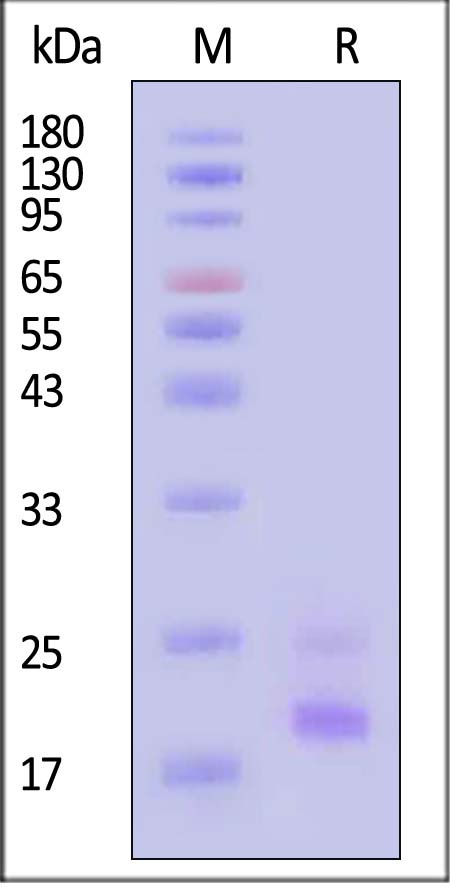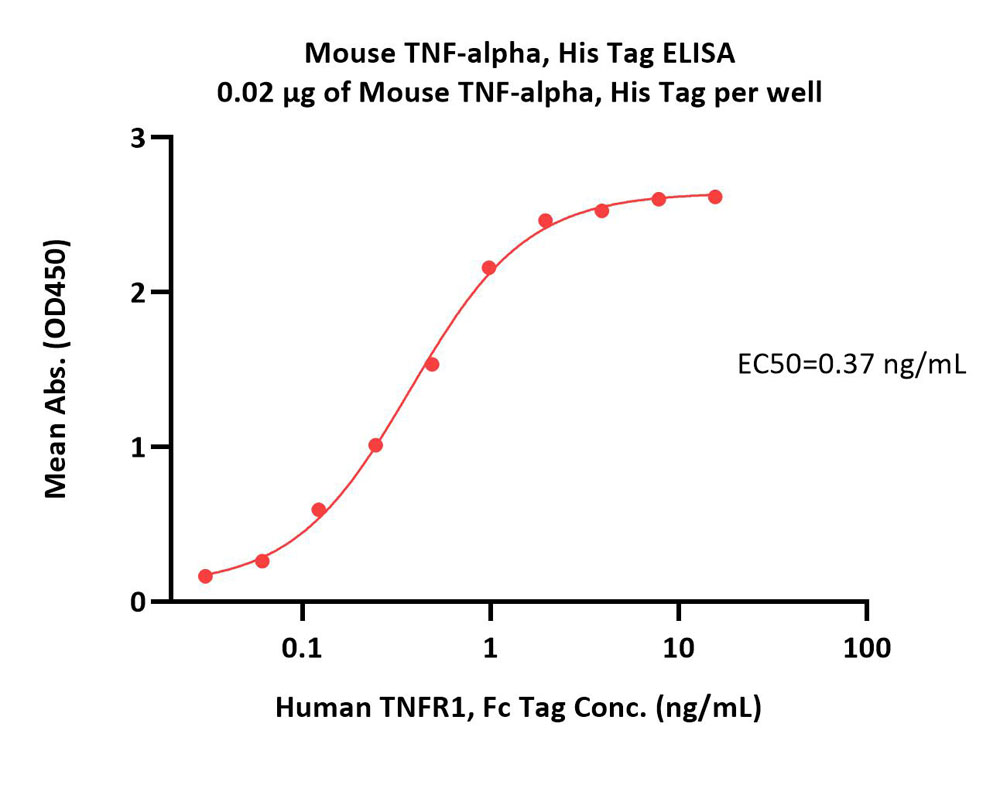分子别名(Synonym)
DIF,TNF-alpha,TNFA,TNFSF2,cachexin,cachectin,TNFα
表达区间及表达系统(Source)
Mouse TNF-alpha, His Tag (TNA-M52H3) is expressed from human 293 cells (HEK293). It contains AA Leu 80 - Leu 235 (Accession # P06804).
Predicted N-terminus: Leu 80
Request for sequence
蛋白结构(Molecular Characterization)

This protein carries a polyhistidine tag at the C-terminus.
The protein has a calculated MW of 19.1 kDa. The protein migrates as 19-20 kDa and 23-24 kDa when calibrated against Star Ribbon Pre-stained Protein Marker under reducing (R) condition (SDS-PAGE) due to glycosylation.
内毒素(Endotoxin)
Less than 1.0 EU per μg by the LAL method.
纯度(Purity)
>95% as determined by SDS-PAGE.
制剂(Formulation)
Lyophilized from 0.22 μm filtered solution in PBS, pH7.4 with trehalose as protectant.
Contact us for customized product form or formulation.
重构方法(Reconstitution)
Please see Certificate of Analysis for specific instructions.
For best performance, we strongly recommend you to follow the reconstitution protocol provided in the CoA.
存储(Storage)
For long term storage, the product should be stored at lyophilized state at -20°C or lower.
Please avoid repeated freeze-thaw cycles.
This product is stable after storage at:
- -20°C to -70°C for 12 months in lyophilized state;
- -70°C for 3 months under sterile conditions after reconstitution.
电泳(SDS-PAGE)

Mouse TNF-alpha, His Tag on SDS-PAGE under reducing (R) condition. The gel was stained with Coomassie Blue. The purity of the protein is greater than 95% (With Star Ribbon Pre-stained Protein Marker).
活性(Bioactivity)-ELISA

Immobilized Mouse TNF-alpha, His Tag (Cat. No. TNA-M52H3) at 0.2 μg/mL (100 μL/well) can bind Human TNFR1, Fc Tag (Cat. No. TN1-H5251) with a linear range of 0.1-1 ng/mL (QC tested).
Protocol

Immobilized Mouse TNF-alpha, His Tag (Cat. No. TNA-M52H3) at 0.2 μg/mL (100 μL/well) can bind Humira with a linear range of 0.1-1 ng/mL (Routinely tested).
Protocol
背景(Background)
Tumor necrosis factor alpha (TNFα) is a cytokine produced primarily by monocytes and macrophages. It is found in synovial cells and macrophages in the tissues.The primary role of TNFα is in the regulation of immune cells. TNFα is able to induce apoptotic cell death, to induce inflammation, and to inhibit tumorigenesis and viral replication. Dysregulation of TNFα production has been implicated in a variety of human diseases, including major depression, Alzheimer's disease and cancer. Recombinant TNFα is used as an immunostimulant under the INN tasonermin. TNFα can be produced ectopically in the setting of malignancy and parallels parathyroid hormone both in causing secondary hypercalcemia and in the cancers with which excessive production is associated.























































 膜杰作
膜杰作 Star Staining
Star Staining











